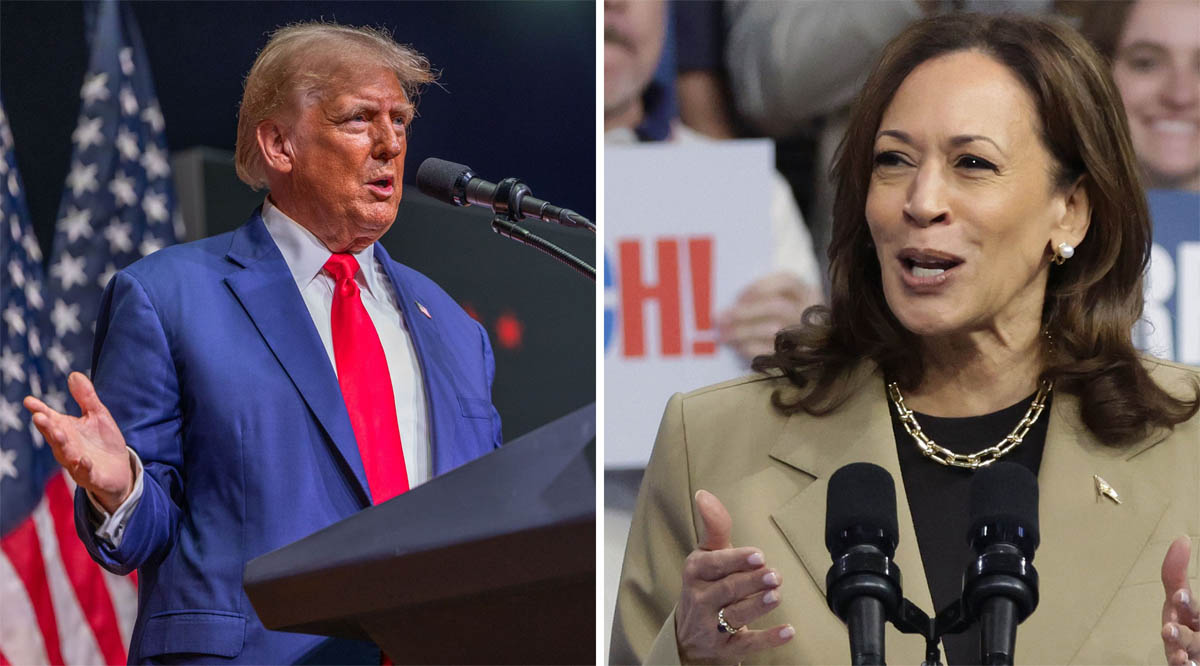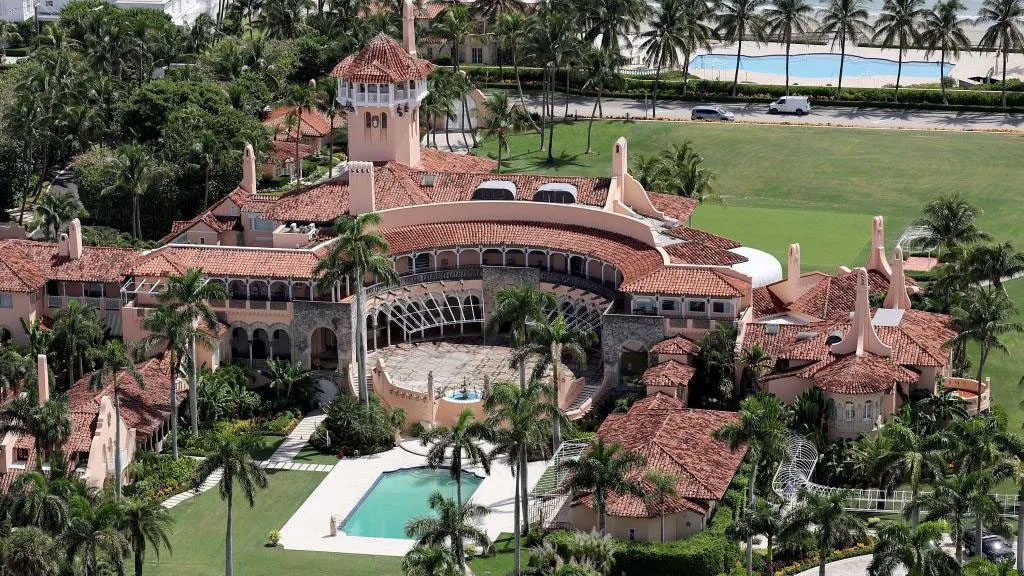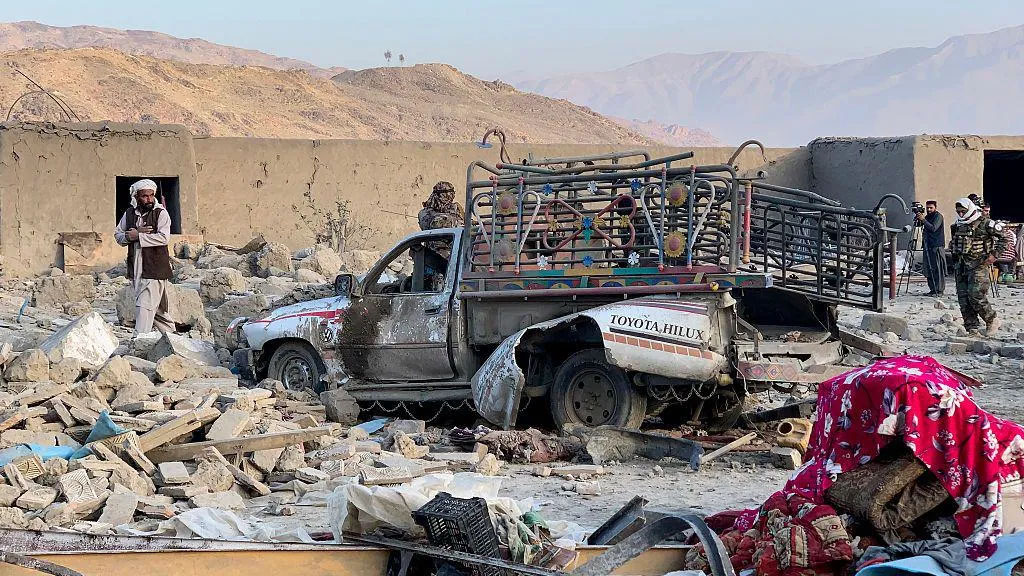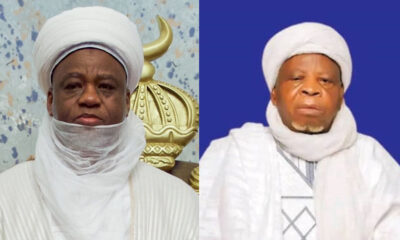A line repeated by his vice presidential pick, Ohio Senator J. D. Vance.
How Electoral College, not popular votes, picks US president
(NANFeatures)

How Electoral College, not popular votes, picks US president
Although the United States prides itself on being the world’s preeminent democracy, where each person can have their say about who should be president, the Constitution calls for states to choose “electors” who do the actual electing.
This is known as the Electoral College.
This includes the first presidential election in 1789, won by George Washington; there have been 59 U.S. elections.
In all but five, two in this century, the president has won both the popular votes and the Electoral College votes.
In 2000, Democratic candidate Al Gore garnered 543,895 more votes nationwide than Republican George W. Bush.
But in a contentious race that went all the way up to the Supreme Court, the judges decided to end a recount in Florida, giving the state’s then 25 electoral votes to Bush.
This took Bush past the magic number of 270 electoral votes and ensured him the presidency.
In 2016, when Donald Trump was elected, Hillary Clinton won the popular vote by a much bigger margin, receiving 2.9 million more votes nationwide.
But Trump became president because he garnered 304 electoral votes to Clinton’s 227.
If the number of electoral votes is tied, then the election is decided by the newly elected House of Representatives.
Each state is allotted electors equal to their number of representatives in Congress.
This means there are 538 electors in total: 435 representatives and 100 senators, plus three for the District of Columbia.
If a candidate wins 270 electors or more, therefore, he or she wins the presidency.
In 48 states, the candidate with the most votes, however slim the margin, wins all the state’s electoral votes.
Maine and Nebraska do things differently and allocate electoral votes by individual congressional districts.
Some critics regard the Electoral College as an anachronism and would replace it with a national popular vote.
They say that the Electoral College makes a mockery of the “one person, one vote” system the country extols.
Furthermore, it causes candidates to concentrate their campaigns primarily on a handful of swing states where the vote could go either way, turning the majority of voters elsewhere in the country into bystanders.
But proponents say the reverse would happen if the president were elected by the popular votes.
Then candidates would concentrate their campaigning in the big states—California, Texas, and New York—and voters in smaller states would be the onlookers.
But what really do the two major candidates in the U.S. presidential election represent?
Kamala Harris is the first woman, first black person, and first person of South Asian descent to be vice president of the United States.
After four years in the second highest office, she now wants to make history again by holding the top job.
She received President Joe Biden’s blessing when he stepped back from being the Democratic candidate just three months ago, triggering her whirlwind campaign.
Harris was born on Oct. 20, 1964, in Oakland, California. She often touts her middle-class upbringing to voters: her father Donald migrated from Jamaica to study economics; her mother Shyamala, a cancer researcher and civil rights activist, came from India.
They married in 1963 and separated when Harris was 5 years old.
Harris, 60, has largely played down her gender and race. But she has said that India is an important part of her life.
When she and her younger sister Maya were children, their mother travelled with them to India almost every other year to see relatives there—and to instill in them a love of Indian food.
Shyamala died of colon cancer in 2009. Harris rarely speaks of her father, who went on to become a professor at Stanford University. She once told an interviewer that they are not close.
Harris became the first black district attorney of San Francisco in 2002, and later she served for six years as California’s attorney general.
When she moved to the U.S. Senate in 2017, she used her experience as a prosecutor to make her mark at high-profile hearings by grilling witnesses, from Trump officials to Supreme Court nominees.
Harris met her partner Doug Emhoff, an entertainment lawyer, relatively late in life.
A friend set up a blind date for the two of them in California, where they were living at the time in 2013.
They married the following year.
Emhoff has two adult children from his first marriage: Cole and Ella.
As the first husband of a vice president, Emhoff is also the first “Second Gentleman” of the United States.
Should Harris win and become the first woman to ever hold the presidency, he would be the very first “First Gentleman.”
Donald Trump’s rise to the U.S. presidency, which he held from 2017-2021, upset many assumptions and taboos, but perhaps just as surprising is that he has brushed off two impeachments, a criminal conviction, and several other threats to contend again for the White House.
His come-from-behind win against Hillary Clinton in 2016, by claiming outsider status and promising to bring a businessman’s acumen for dealmaking to the White House, shocked the U.S. political system and fundamentally changed the Republican party.
In 2024, four years after losing to Joe Biden, he still casts himself as the man to shake up U.S. politics by taking on the corrupt elites.
All the while he has kept his brash campaign style, prone to riffing on theories well outside the mainstream, and rarely shying away from an opportunity to personally insult or belittle his opponents.
If Trump wins, the 78-year-old would be the oldest person in U.S. history elected president.
Born June 14, 1946, he was the fourth of five children of Frederick Trump, a real estate magnate who bequeathed a small New York empire to his family.
At age 13, Trump’s parents sent him to a military academy.
The future president went on to study at Fordham University and then the University of Pennsylvania’s prestigious Wharton School of Business.
After graduating from Wharton, he joined his father’s business and, in 1974, became its president and renamed it the Trump Organisation.
Investments in hotels, casinos, golf courses, luxury apartments, and beauty pageants followed.
As the star of the TV reality show “The Apprentice,” he relished delivering bad news to failed contenders, telling them curtly, “You are fired.”
Trump dipped into politics from time to time but seemed galvanised under the administration of Barack Obama and morphed into a right-wing populist.
He loudly peddled the lie that Obama was not born in the United States.
Trump’s critics, which include several high-profile members of his first administration, have cast him as chaotic, divisive, and a threat to democracy.
General John Kelly, his former chief of staff, recently likened him to a “fascist.”
His rhetoric has been crude and dark at rallies, veering from crass insults to false claims and menacing warnings, like his suggestion this month he could use the military to handle what he called “the enemy from within.”
Like in 2016, his 2024 campaign has put an anti-immigration stance front and centre.
In 2016, he said some Mexican immigrants were rapists and murderers; this year he baselessly accused Haitian immigrants of eating pets in the town of Springfield, Ohio.
A line repeated by his vice presidential pick, Ohio Senator J. D. Vance.
(NANFeatures)

US Adds 19 More Nigerians to ‘Worst of the Worst’ Deportation List
The United States government has added 19 more Nigerian nationals to its “worst of the worst” criminal aliens list, bringing the total number of Nigerians scheduled for deportation to 113. The move targets convicted criminals who have served time in U.S. courts and are deemed a threat to public safety.
According to the U.S. Department of Homeland Security (DHS), the newly listed Nigerians were convicted of serious crimes, including sexual assault on a minor, fraud, assault, drug trafficking, and money laundering. These individuals were arrested by U.S. Immigration and Customs Enforcement (ICE) and will be deported after completing immigration procedures.
A DHS statement highlighted the purpose of the programme:
“The U.S. Department of Homeland Security is highlighting the worst of the worst criminal aliens arrested by U.S. Immigration and Customs Enforcement. Under Secretary Kristi Noem’s leadership, ICE is carrying out deportations — starting with the worst of the worst.”
READ ALSO:
Among those newly added to the list are Adeolu Solabu, Oladayo Agboola, Chinonso Ochie, Oluchi Jennifer Chimdimma Chime, Samuel Omorodion, Sunday Adediora, Sunday Kunkushi, Mkpouto Etukudoh, as well as Marcus Unigwe, Kehinde James, Blessing Uchanma, Victor Adebisi, Richard Ugbah, Olaniyi Ojikutu, Oluwamuyiwa Olawoye, Okechukwu Amadi, Femi Jolayemi, Anthony Asanya, Izuchukwu Okoye, and Ebele Agbasiele.
This latest addition follows a previous announcement in which 79 Nigerian nationals had already been slated for deportation for offences ranging from fraud, manslaughter, assault, robbery, to drug-related crimes. The combined total of 113 Nigerians reflects the U.S. government’s intensified focus on criminal aliens.
The move has sparked renewed discussion about U.S. immigration enforcement, diplomatic engagement with Nigeria, and the rights and welfare of deportees. Advocates have raised concerns about ensuring due process and humane treatment for those returned to Nigeria, while authorities stress that deportation is a legal measure targeting foreign nationals convicted of serious crimes.
Globally, Nigerians have faced similar deportation measures, including large-scale removals from countries like India, where thousands were repatriated for visa violations or alleged criminal activities. The ongoing deportations underscore the challenges facing Nigerian citizens abroad amid tightened international immigration and law enforcement policies.

Armed Man Shot Dead at Trump’s Mar‑a‑Lago Residence by Secret Service
An armed man was shot and killed early Sunday after breaching the secure perimeter of Donald Trump’s Mar‑a‑Lago residence in Palm Beach, Florida, the United States Secret Service confirmed. The incident occurred around 1:30 a.m. ET (06:30 GMT) while Trump and First Lady Melania Trump were in Washington, D.C.
Authorities said the suspect, later identified as Austin Tucker Martin, a 21-year-old from Cameron, North Carolina, was carrying a shotgun and a fuel canister when confronted by Secret Service agents and a Palm Beach County sheriff’s deputy. Officers ordered him to drop the items, but he raised the shotgun toward them, prompting them to fire and neutralise the threat. No law enforcement officers were injured in the incident. Martin’s family had reported him missing hours before the shooting. Moore County authorities said the missing-person report was turned over to federal investigators. Officials are examining whether he acquired the firearm during his drive from North Carolina to Florida. A box for the shotgun was later recovered from his vehicle.
READ ALSO:
Palm Beach County Sheriff Ric Bradshaw described the encounter: the suspect dropped the fuel can but lifted the shotgun into a threatening position. “At that point, agents fired their weapons to neutralise the threat,” Bradshaw said. Officers involved were equipped with body cameras, which captured the incident. The FBI is leading the investigation with support from the Secret Service and local law enforcement. Officials are analyzing bodycam footage, gathering evidence, and creating a psychological profile of the suspect. Authorities have yet to determine a motive.
Mar‑a‑Lago is heavily guarded, with an outer cordon maintained by local Palm Beach deputies and an inner perimeter secured by the Secret Service. Visitors are screened, and vehicles and bags are checked with metal detectors and sniffer dogs. The shooting adds to a history of threats against Trump. In July 2024, Trump was grazed by a bullet at a rally in Butler, Pennsylvania, where one bystander was killed and two others injured. Another would-be assassin, Ryan Routh, attempted an attack at Trump International Golf Club in West Palm Beach and was recently sentenced to life in prison. Following the Mar‑a‑Lago shooting, Secret Service Director Sean Curran traveled to Florida to oversee “after-actions” and reinforce operational communication and response protocols.
Political violence has become a prominent topic in the US. Treasury Secretary Scott Bessent criticized what he described as “normalizing violence” in politics, referencing previous assassination attempts and recent high-profile attacks, including the public shooting of right-wing activist Charlie Kirk and the fatal shootings of a Democratic lawmaker and her husband in Minnesota. The FBI and Secret Service are continuing the investigation to determine the suspect’s motive and possible affiliations, with authorities pledging to release updates as more information becomes available.

Women, Children Killed as Pakistan Launches Overnight Strikes on Afghanistan
Pakistan has carried out deadly overnight airstrikes on Afghanistan, killing at least 18 people, including women and children, according to the Afghan Taliban, in a major escalation of Pakistan–Afghanistan tensions along their volatile border.
Islamabad confirmed that the operation involved precision airstrikes against seven alleged militant camps and hideouts close to the Pakistan–Afghanistan border, saying the attacks were launched in retaliation for recent suicide bombings inside Pakistan. Pakistani officials said the strikes were intelligence-based and aimed at eliminating armed groups accused of orchestrating cross-border attacks.
The Taliban government in Afghanistan strongly condemned the strikes, accusing Pakistan of bombing civilian homes and a religious school. Afghan authorities described the attacks as a violation of national sovereignty and warned that continued military action could worsen regional instability.
According to Afghanistan’s defence ministry, the airstrikes hit civilian areas in Nangarhar and Paktika provinces. In Girdi Kas village in the Bihsud district of Nangarhar, residents said entire families were affected when homes were destroyed. Local Taliban officials said 18 members of one family were killed, while only a few survived. Earlier casualty estimates had placed the death toll at around 20 people, though figures were later revised.
READ ALSO:
In Paktika province, strikes reportedly hit a guesthouse and a religious school in the Bermal and Urgun districts. Local officials said those facilities were empty at the time, and no deaths were reported there.
Pakistan’s Ministry of Information and Broadcasting said the military action involved “selective targeting” of fighters linked to the banned Tehreek-i-Taliban Pakistan (TTP), which Islamabad refers to as Fitna al Khawarij, as well as elements of the Islamic State-Khorasan Province. The ministry described the operation as a retributive response to terror attacks it said were planned from Afghan soil.
The latest escalation follows a series of deadly attacks in Pakistan, including a suicide bombing at a Shia mosque in Islamabad earlier this month and additional assaults in Khyber Pakhtunkhwa since the start of Ramadan. Pakistan accused the Afghan Taliban of failing to rein in militants, claiming it had conclusive evidence that some of the attacks were directed from across the border. Kabul has repeatedly denied allowing Afghan territory to be used against neighbouring countries.
In a strongly worded response, the Taliban’s defence ministry described the airstrikes as a “blatant violation of Afghanistan’s territorial integrity” and a “clear breach of international law.” It warned that an “appropriate and measured response” would be taken at a suitable time, accusing Pakistan of flawed intelligence for hitting civilian targets and religious institutions.
The strikes come despite a fragile ceasefire reached in October after deadly cross-border clashes, the worst since the Taliban returned to power in 2021. Although that truce reduced large-scale fighting, sporadic clashes and air operations have continued to strain relations.
Tensions had briefly eased earlier this week after Saudi Arabia mediated the release of three Pakistani soldiers captured during last year’s border clashes. However, analysts warn that the latest airstrikes could undermine diplomatic efforts, worsen humanitarian conditions in border communities, and heighten the risk of further retaliation.
Pakistan and Afghanistan share a 1,600-mile mountainous border, long plagued by militancy, smuggling, and recurring military confrontations, making it one of the region’s most unstable frontiers.


Dangote Opens Refinery Investment to Nigerians With Public Share Sale Plans


UTME: JAMB Clarifies Position on Hijab During Biometric Capture


Tinubu Hails Wike as APC Dominates 2026 FCT Area Council Elections


Regina Daniels Takes Delivery of ₦150m 2026 GAC Trumpchi M8 SUV


ADC Defeats APC to Win First Polling Unit in FCT Area Council Election


FCT Council polls: APC Wins Four Chairmanship Seats as PDP Takes Gwagwalada


Yoruba Muslim Group Dismisses Viral Ramadan Date Claim, Reaffirms Sultan of Sokoto’s Authority


Opposition Weakens as Another Governor Eyes APC Move